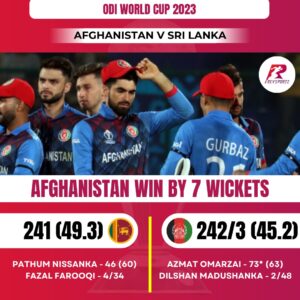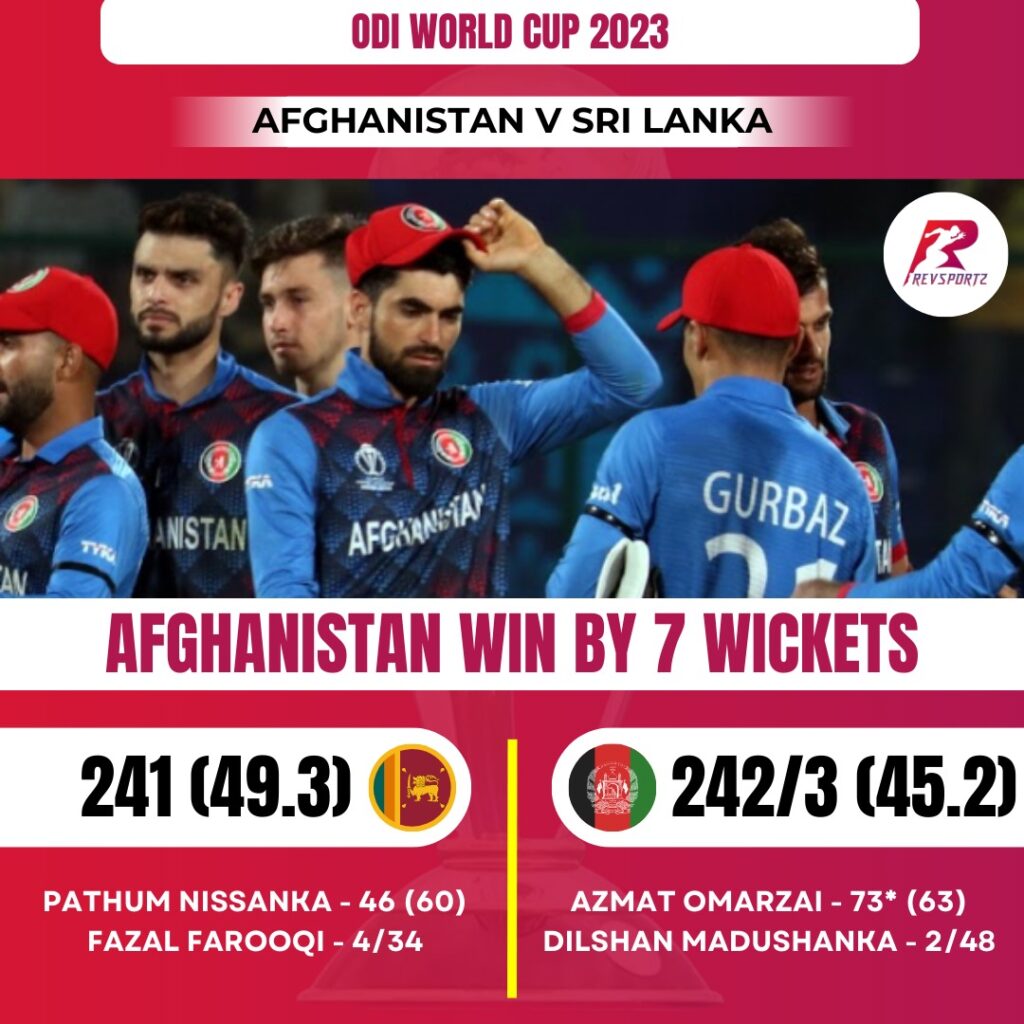
Afghanistan, who had won only one World Cup game before the start of the 2023 World Cup, can now point to three World Cup victories in a matter of weeks. Impressively, all three have come against former World Champions, with their latest triumph being over Sri Lanka, winners in 1996. On one of the best batting tracks in India, Sri Lanka had the chance to set a massive total. However, the Afghan bowlers, led by Fazalhaq Farooqi, who achieved his best ODI bowling figures of 4-34, and Mujeeb Ur Rahman (2-38), restricted them to a below-par total of 241. In response, the Afghan batters displayed professionalism, with Rahmat Shah, skipper Hashmatullah Shahidi, and Azmatullah Omarzai all scoring fifties to successfully complete the run chase with 28 balls remaining.
Sri Lanka had themselves to blame for folding with the bat, especially on a brilliant batting surface. Even though three batters contributed decently, none of them could convert their starts into substantial innings, which hurt Sri Lanka’s chances of posting a competitive total.
Gaining confidence from their impressive victory over Pakistan, where they successfully chased down a target of 283, Shahidi won the toss and chose to field. Farooqi, making a comeback to the XI, struck early by dismissing Dimuth Karunaratne, who was also making his return to the side.
In-form Pathum Nissanka and Kusal Mendis, the Sri Lanka captain, steadied the innings with a 62-run partnership, but they could not dominate the bowlers. Afghanistan’s spinners maintained control over the run rate during the middle overs. The pressure paid off as both well-set batsmen were dismissed by the impressive Mujeeb. Rashid Khan, on his 100th ODI appearance, joined the party by taking the wicket of Dhananjaya de Silva.
This marked the beginning of a collapse as Sri Lanka went from 139 for 4 to 185 for 7. Angelo Mathews and Maheesh Theekshana put on a 45-run partnership for the eighth wicket, taking the score past 200. However, one must wonder why the earlier batters failed to accelerate at a similar pace. Continued failures from capable batters like Charith Asalanka and de Silva did not help either. It can be said that overreliance on just three batters – Nissanka, Mendis, and Sadeera Samarawickrama – proved detrimental to Sri Lanka’s chances.
Sri Lanka needed early wickets with the new ball to have any chance of defending the target. Dilshan Madushanka struck early, dismissing in-form opener Rahmanullah Gurbaz for a duck in the first over. In came Rahmat Shah, who absorbed the pressure and contributed 73 runs for the second wicket alongside Ibrahim Zadran. Madushanka returned for his second spell in the 17th over and ended the partnership by dismissing Zadran with a well-directed bouncer.
Rahmat continued his solid performance, reaching yet another half-century, setting the stage for a partnership of 58 runs with skipper Hashmatullah Shahidi. However, Rahmat’s innings ended when he got the leading edge to a Kasun Rajitha delivery in the 28th over. After his departure, Shahidi took it upon himself to guide his team to victory. He received excellent support from Omarzai, who played the role of the aggressor in an unbroken fourth-wicket partnership of 111 runs that took Afghanistan home with a degree of comfort.
Afghanistan next play the Netherlands, the other surprise package in the competition, and still cling on to slim hopes of a semi-final spot. For a well-beaten Sri Lanka, there aren’t even crumbs of comfort.




